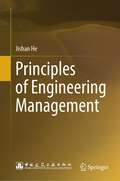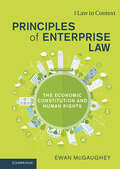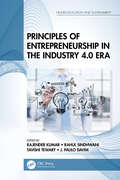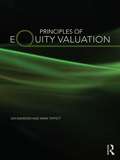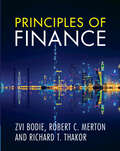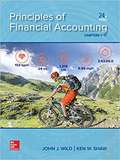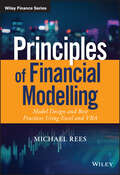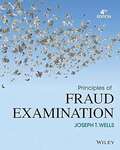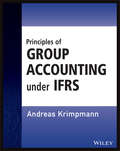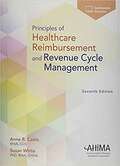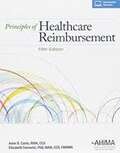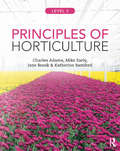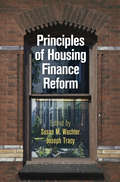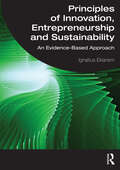- Table View
- List View
Principles of Engineering Management
by Jishan HeThis book presents a comprehensive overview of engineering management, giving readers a complete picture of this research field. Following an introduction, the book explores: • Engineering Management Ontology • Engineering Management Epistemology • Engineering Management Methodology • Engineering Management Decision Theory • Engineering Management Organization Theory • Engineering Management Value Theory • Engineering Management Innovation Theory • Engineering Management Environment Theory • Engineering Management Humanities • Engineering Management Ethics Theory The book includes case studies that demonstrate how various concepts can be practically applied to resolve real-world problems. The book is a valuable read for professionals of engineering management, management and systems engineering.
Principles of Enterprise Law: The Economic Constitution and Human Rights (Law in Context)
by Ewan McGaugheyMajor enterprises shape our lives in countless ways: big tech and 'surveillance media' that affect democratic debate, algorithms that influence online shopping, transport to work and home, energy and agriculture corporations that drive climate damage, and public services that provide our education, health, water, and housing. The twentieth century experienced swings between private and public ownership, between capitalism and socialism, without any settled, principled outcome, and without settling major questions of how enterprises should be financed, governed and the rights we have in them. This book's main question is 'are there principles of enterprise law', and, if they are missing, 'what principles of enterprise law should there be'? Principles of Enterprise Law gives a functional account of the 'general' enterprise laws of companies, investment, labour, competition and insolvency, before moving into specific enterprises, from universities to the military. It is an original guide to our economic constitution and human rights.
Principles of Entrepreneurship in the Industry 4.0 Era (Higher Education and Sustainability)
by J. Paulo Davim Rahul Sindhwani Tavishi Tewary Rajender KumarThe feature that distinguishes this book from all other books on entrepreneurship is the comprehensive discussion of the challenges and opportunities that entrepreneurs encounter in the Industry 4.0 era. It enables readers to start dreaming big, visualizing, and encourages them to think clearly and creatively. The book emphasizes creativity and innovation as the core of entrepreneurship, by stretching imagination, thinking about problems and solutions, and visualizing their ventures at the local, national, and global scale. It also discusses the role of women in private enterprise, and entrepreneurship in the post COVID-19 world.
Principles of Environmental Economics and Sustainability: An Integrated Economic and Ecological Approach
by Ahmed HussenRecent years have witnessed considerable consolidation between the disciplines of environmental and ecological economics at research level, but until now textbooks in the area have done little to reflect this. Ahmed Hussen’s book is to date the only one to reconcile the two standpoints. The central focus of the book will continue to be on this systematic integration of both mainstream and ecological approaches to environmental economics, and an acknowledgement that enduring solutions to major contemporary environmental challenges can be obtained through studies based on a well-conceived and balanced interdisciplinary approach. However, this third edition also contains much that is new. Chiefly, brand new chapters appear covering the following topics: The economics of climate change The economics of biodiversity and ecosystem services ‘Green’ accounting and alternative economic and social indicators of sustainability The business case for environmental sustainability An Appendix that provides a brief historical account of the development of ecological economics The result is a comprehensive introduction to the main facets of environmental and ecological economics — a text that boldly refuses to put up barriers between disciplines and takes a holistic approach to vital issues. This student-friendly textbook contains a variety of study tools including learning points, boxed features, case studies, revision questions and discussion questions, and an Appendix that provides students with a review of basic economic principles relevant to the study of the environment and its management. Written in a clear and accessible style, this book will prove an excellent choice for introducing both students and academics to the world of environmental economics.
Principles of Environmental Economics and Sustainability: An Integrated Economic and Ecological Approach
by Ahmed HussenPrinciples of Environmental Economics and Sustainability was the first textbook to make a serious attempt to systematically integrate ecological and economic principles. It successfully introduced ecological perspectives to the study of environmental economics while maintaining the integrity of the standard economic approach. In this new edition this notion continues to be embraced while also offering readers several further features, including greater in-depth coverage of the economics of climate change, expanded reference sections, and an updated and expanded "review and discussion questions" section. The unique integration of both mainstream and ecological approaches which this textbook provides proves particularly illuminating in relation to the following topics: economics of climate change environmental valuation cost–benefit analysis and the environment sustainability in theory and practice limits to growth the role of technology the business case for environmental sustainability. Written in a clear and accessible way, this key textbook is an excellent resource for all students of environmental economics. With study tools including learning objectives, case studies, and charts and graphs, this volume uses real-world examples to engage both students and academics within the field.
Principles of Equity Valuation
by Ian Davidson Mark TippettThe book provides a rigorous introduction to corporate finance and the valuation of equity. The first half of the book covers much of the received theory in these areas such as the relationship between the risk of an equity security and the return one can expect from it, the effects of leverage (that is, the borrowing policies of the firm) on the return one can expect from the firm’s shares and the role that dividends, operating cash flows and accounting earnings play in the valuation of equity. The second half of the book is more advanced and deals with the important role that "real options" (that is, as yet unexploited investment opportunities) play in the valuation of equity.
Principles of Equity and Trusts
by Alastair HudsonPrinciples of Equity and Trusts is a concise new textbook from Alastair Hudson - the author of the definitive classic, Equity and Trusts. Through clear and careful analysis, the author explains what the law is, its foundational principles, and its social and economic effect. By beginning with the core principles on which this field is based, even the most complex academic debates concerning express, resulting and constructive trusts, the family home, charities law and other equitable doctrines become comprehensible and interesting. This book offers a fresh, lively and often humorous account of Equity and Trusts. Through easy-to-follow worked examples and analysis of the case law, Alastair helps you to answer problem questions and to prepare coursework. The author shows how the law affects real people in real situations. Each chapter begins with a clear and concise introduction to the core principles. It contains numbered headings for ease of navigation and advice on studying this subject. Students also have access to Professor Hudson's ever-popular supporting website which has had hundreds of thousands of hits over the years. It has over 50 brief podcasts on key issues which have been specially re-recorded to coincide with the publication of this book. That website also contains detailed lectures, a variety of videos explaining the law and guidance on tackling assessments. Characterised by the passion and enthusiasm for his subject matter that make Alastair Hudson's classic textbook so popular, Principles of Equity and Trusts is sure to be a winner with both academics and students alike.
Principles of Equity and Trusts
by Alastair HudsonThis is the second edition of Principles of Equity and Trusts , the concise new textbook from Alastair Hudson – the author of the definitive classic, Equity and Trusts. Through clear and careful analysis, the author explains what the law is, its foundational principles, and its social and economic effect. By beginning with the core principles on which this field is based, even the most complex academic debates concerning express, resulting and constructive trusts, the family home, charities law and other equitable doctrines become comprehensible and interesting. This book offers a fresh, lively and often humorous account of Equity and Trusts. Through easy-to-follow worked examples and analysis of the case law, Alastair helps you to answer problem questions and to prepare coursework. The author shows how the law affects real people in real situations. Each chapter begins with a clear and concise introduction to the core principles. It contains numbered headings for ease of navigation and advice on studying this subject. Students also have access to Professor Hudson’s ever-popular supporting website, which has had hundreds of thousands of hits over the years. It has over 50 brief podcasts on key issues which have been specially re-recorded to coincide with the publication of this book. That website also contains detailed lectures, a variety of videos explaining the law and guidance on tackling assessments. Characterised by the passion and enthusiasm for his subject matter that make Alastair Hudson’s classic textbook so popular, Principles of Equity and Trusts is sure to be a winner with both academics and students alike.
Principles of Finance
by Zvi Bodie Robert C. Merton Richard T. ThakorWritten for the MBA or undergraduate first course in finance, as well as follow-on courses, this textbook provides a clear, accessible, and thorough explanation of the principles of finance; how they connect to real-world practice and how they are used to solve problems. Structured around ten unifying principles representing the core tenets of the science, this book imparts basic financial concepts irrespective of the institutional framework, ensuring that students learn about finance in a way that is applicable both now and into the future. Pedagogical features include learning objectives and major takeaways, applications in the world of business, numerous worked examples, key equation boxes highlighting the most important financial equations, quick check questions with solutions, key finance terms with a detailed glossary, and more than 380 homework problems. Online resources include a solutions manual, detailed instructor manual to adapt the book to your course, lectures slides and a 800 question text bank for instructors.
Principles of Financial Accounting
by John Wild Ken ShawPrinciples of Financial Accounting responds to the market’s request for a financial accounting text with a sole-proprietorship approach. Chapter opening vignettes using dynamic entrepreneurs appeal to all students and show the relevance of accounting. Students are encouraged to think like a businessperson and apply what they learn. A wide variety of assignments provide instructors with materials to teach, assess, and challenge students on several levels.
Principles of Financial Economics
by Stephen F. LeroyFinancial economics, and the calculations of time and uncertainty derived from it, are playing an increasingly important role in non-finance areas, such as monetary and environmental economics. In this 2001 book, Professors Le Roy and Werner supply a rigorous yet accessible graduate-level introduction to this subfield of microeconomic theory and general equilibrium theory. Since students often find the link between financial economics and equilibrium theory hard to grasp, they devote less attention to purely financial topics such as calculation of derivatives, while aiming to make the connection explicit and clear in each stage of the exposition. Emphasis is placed on detailed study of two-date models, because almost all of the key ideas in financial economics can be developed in the two-date setting. In addition to rigorous analysis, substantial sections of discussion and examples are included to make the ideas readily understandable.
Principles of Financial Modelling: Model Design and Best Practices Using Excel and VBA (The Wiley Finance Series)
by Michael ReesThe comprehensive, broadly-applicable, real-world guide to financial modelling Principles of Financial Modelling – Model Design and Best Practices Using Excel and VBAcovers the full spectrum of financial modelling tools and techniques in order to provide practical skills that are grounded in real-world applications. Based on rigorously-tested materials created for consulting projects and for training courses, this book demonstrates how to plan, design and build financial models that are flexible, robust, transparent, and highly applicable to a wide range of planning, forecasting and decision-support contexts. This book integrates theory and practice to provide a high-value resource for anyone wanting to gain a practical understanding of this complex and nuanced topic. Highlights of its content include extensive coverage of: Model design and best practices, including the optimisation of data structures and layout, maximising transparency, balancing complexity with flexibility, dealing with circularity, model audit and error-checking Sensitivity and scenario analysis, simulation, and optimisation Data manipulation and analysis The use and choice of Excel functions and functionality, including advanced functions and those from all categories, as well as of VBA and its key areas of application within financial modelling The companion website provides approximately 235 Excel files (screen-clips of most of which are shown in the text), which demonstrate key principles in modelling, as well as providing many examples of the use of Excel functions and VBA macros. These facilitate learning and have a strong emphasis on practical solutions and direct real-world application. For practical instruction, robust technique and clear presentation, Principles of Financial Modelling is the premier guide to real-world financial modelling from the ground up. It provides clear instruction applicable across sectors, settings and countries, and is presented in a well-structured and highly-developed format that is accessible to people with different backgrounds.
Principles of Food Science
by Janet D. Ward Larry T. WardPrinciples of Food Science is designed to help you learn about the relationships among science, food, and nutrition. Basic laws of chemistry, microbiology, and physics are applied to the production, processing, preservation, and packaging of food. You will explore the characteristics of each component found in food. You will examine the helpful and harmful effects of micro-organisms on the food supply.
Principles of Fraud Examination
by Joseph T. WellsPrinciples of Fraud Examination 4th Edition by Joe Wels contains engaging real-life case studies and an analysis of the complexity of frauds and fraudulent behavior incorporated throughout the book. This text provides a broad understanding of fraud—what it is and how it is committed, prevented, and resolved. Principles of Fraud Examination 4th Edition begins by providing an understanding of fraud examination methodology then documents the schemes used by executive, managers, and employees to commit fraud against their organizations. Case studies, complete with statistics and flowcharts, are provided for each chapter. <p><p>The primary focus of this text is maintained in the updated edition, with coverage of the actual accounting and human behaviors that lead to cases of accounting fraud. The 4th edition includes updates to reflect new and revised accounting standards and laws, updated statistics to include the most recent ACFE findings, and moderate changes to end of chapter material. Also included in the newest edition is updated coverage of recent examples of fraud accounting in the real world.
Principles of Good Measurement
by Dave Ulrich Brian E. Becker Mark A. HuselidThe performance-measurement system you use plays an important role in securing HR's credibility and determining its place in the firm. A sound measurement system improves HR's decision-making by focusing on aspects of the organization that create value, and provides a valid and systematic justification for the allocation of resources. This chapter focuses on thinking strategically about measurement, providing essential principles for developing and implementing a performance-measurement system that will support investment in HR as a strategic resource.
Principles of Group Accounting under IFRS
by Andreas KrimpmannA professional perspective to implementing IFRS 10, 11, and 12 The new International Financial Reporting Standards (IFRS) 10, 11, and 12 are changing group accounting for many businesses. As business becomes increasingly global, more and more firms will need to transition using the codes and techniques described in Principles of Group Accounting under IFRS. This book is a practical guide and reference to the standards related to consolidated financial statements, joint arrangements, and disclosure of interests. Fully illustrated with a step-by-step case study, Principles of Group Accounting under IFRS is equally valuable as an introductory text and as a reference for addressing specific issues that may arise in the process of consolidating group accounts. The new international standards will bring about significant changes in group reporting, and it is essential for accountants, auditors, and business leaders to understand their implications. Author Andreas Krimpmann is an internationally recognized authority on the transition from GAAP to IFRS, and this new text comes packaged with GAAP/IFRS comparison resources that will help make the changes clear. Other bonus resources include an Excel-based consolidation tool, checklists, and a companion website with the latest information. Learn about: Definitions, requirements, processes, and transition techniques for IFRS 10, 11, and 12 covering group level accounting Practical implementation strategies demonstrated through a clear case study of a midsize group Key concepts related to consolidated financial statements, joint ventures, management consolidation, and disclosure of interests Comparisons between GAAP and IFRS to clarify the required changes for international firms Whatever stage of the consolidation process you are in, you will appreciate the professional perspective in Principles of Group Accounting under IFRS.
Principles of Health and Safety at Work
by Jim Allen Allan St HoltThis is a reprint of ISBN 978-0-901-35743-4 Widely acknowledged as the one stop summary of health and safety fundamentals, Principles covers law, safety technology, occupational health and hygiene and safety management techniques. Originally written by the late international health and safety expert Allan St John Holt, this new edition has been comprehensively updated by Allan's colleague Jim Allen. The book is designed as a concise, accessible introduction to health and safety basics and includes revision notes and a wide range of references. It is a first class resource for NEBOSH Certificate students.
Principles of Healthcare Reimbursement
by Anne CastoPrinciples of Healthcare Reimbursement integrates information about all US healthcare payment systems into one authoritative resource. Boost your understanding of the complex financial systems in today's healthcare environment, including the basics of health insurance, public funding programs, managed care contracting, and how services are paid. Gain clear insight into how reimbursement systems have made an impace on providers and payers, consumers, public policy makers, and the development of classification and information technology systems over the years.
Principles of Healthcare Reimbursement
by Anne CastoPrinciples of Healthcare Reimbursement 7th Edition
Principles of Healthcare Reimbursement, Fifth Edition
by Elizabeth Forrestal Anne B. CastoThe fifth edition of Principles of Healthcare Reimbursement provides educators, students, and practitioners with up-to-date information on healthcare payment systems and their effects on the US healthcare delivery system and economy in one authoritative source.
Principles of Horticulture
by Charles Adams Jane Brook David Francis Mike EarlyGardening and horticulture generally are essentially practical activities much enhanced by an understanding of how plants grow. This colourful guide will introduce you to the fundamentals of horticulture. It is written in a clear and accessible style and covers the principles that underpin growing plants for the garden and allotment, with reference to how these are tackled by professionals.With highlighted definitions, key points and illustrations in full colour, this book will be a useful companion as you progress in the study and practice of horticulture. The book covers topics such as classifying and naming plants, the plant life cycle, ecology and garden wildlife, soils, composts, hydroponics, weeds, plant nutrition, plant pests, and plant diseases and disorders. The new edition has been updated to reflect changes in legislation and the modernization of horticultural practices. It is also fully reflective of the changes in the new syllabuses for horticulture at Level 2.Principles of Horticulture is a valuable resource whether you are taking a Level 2 RHS, City and Guilds, Teagasc or SNQ course, or are a keen amateur or seasoned gardener.The book is accompanied by ancillary materials including essential and extended information on horticultural principles and downloadable instructor resources.
Principles of Horticulture: Level 3
by Charles Adams Mike Early Jane Brook Katherine BamfordThis colourful guide will explain the fundamentals of growing plants, whether you are taking a Level 3 RHS, City and Guilds or Edexcel course, are a grower or gardener in the industry, or are just a keen amateur. Written in a clear and accessible style, this book covers the principles that underpin plant production, the use of growing media and crop protection, but with reference also to the same practices in the garden or allotment. With highlighted definitions, key points, and illustrated in full colour, this book will be a useful companion as you progress in the study and practice of horticulture. Complete with a companion website which includes extended horticultural information, questions and exercises to test your knowledge, syllabus cross-referencing and downloadable tutor and student support materials.
Principles of Housing Finance Reform
by Susan M. Wachter Joseph TracyIn the fall of 2008, the world watched in horror as the U.S. housing finance system shattered, triggering a global financial panic and ultimately the Great Recession. Now, nearly a decade later, the long and slow housing recovery has reached a critical moment. Though the housing finance system has stabilized, it remains in the hands of the federal government, leaving taxpayers exposed to the credit risk while private funding remains mostly on the sidelines.Principles of Housing Finance Reform identifies the changes necessary to modernize the housing finance system, identifying guiding principles that should underlie a rebuilt system. Contributors to the volume set out a wealth of innovative solutions that are possible within this framework, presenting proposals for long-term structural reforms that would infuse new life into the U.S. housing finance system while enhancing long-term stability.Nearly a decade after the inception of the Great Recession, reform proposals have arisen across the political spectrum. This is a moment of opportunity for rebuilding a key sector of the U.S. economy. The research in this volume represents the best thinking of policy researchers and economic experts on the challenges that lie ahead and provides a roadmap for reforms to create a system characterized by liquidity, stability, access, and sustainability.Contributors: W. Scott Frame, Meghan Grant, John Griffith, Diana Hancock, Stephanie Heller, Akash Kanojia, Patricia C. Mosser, Kevin A. Park, Wayne Passmore, Roberto G. Quercia, David Scharfstein, Phillip Swagel, Joseph Tracy, Susan M. Wachter, Dale A. Whitman, Mark A. Willis, Joshua Wright.
Principles of Innovation, Entrepreneurship and Sustainability: An Evidence-Based Approach
by Ignatius EkanemThis book presents the principles governing the entrepreneurial and innovation mindset and processes of people working in the small business sector and other organisations, based on research findings from real-life issues and challenges that face entrepreneurs on a daily basis. Entrepreneurship development forms the bedrock of business evolution and economic growth in many nations: indeed, without entrepreneurship, there can be no real economic development. This book provides students with an accessible introduction to innovation and entrepreneurship, examining the different forms of innovative and entrepreneurial practice including commercial and social enterprise. The book introduces some of the major business management issues faced by entrepreneurs and small business owners. It also introduces readers to such concepts as opportunity recognition and the ability to act upon opportunities and problem solving. Throughout, the book is founded on an evidence base drawn from the author's own years of teaching and research. An essential read for students of entrepreneurship and innovation at both undergraduate and postgraduate levels, Principles of Innovation, Entrepreneurship and Sustainability: An Evidence-Based Approach is an invaluable resource for anyone seeking to understand the realities of innovation and entrepreneurship in a more empirical context. Featuring a comprehensive range of case studies, reading lists, glossaries and discussion questions, this book provides students with all they need to develop their understanding of these exciting topics. The book is accompanied by digital learning resources including PowerPoint slides and test questions, complete with answers, for all chapters.
